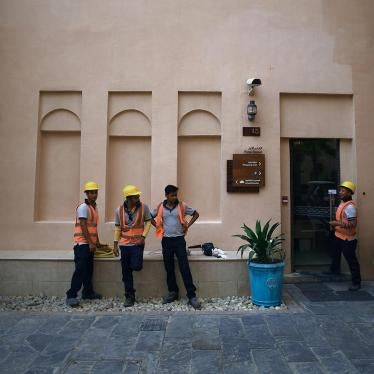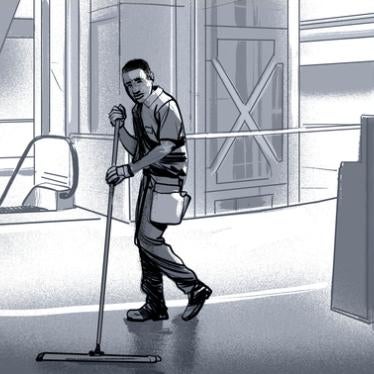(Beirut) – Qatari authorities have failed to provide redress for hundreds of migrant workers who are suffering from months of unpaid wages at two companies, even though authorities have repeatedly been informed of these abuses, Human Rights Watch said today.
The Workers’ Support and Insurance Fund, which the government established in 2018 specifically to ensure that workers are paid their wages when companies fail to pay, has not been utilized to benefit these struggling workers in the two companies.
“It is disheartening that hundreds of workers in at least two companies are struggling to obtain their unpaid wages even though the Qatari government has been made aware of these abuses over and over again,” said Maham Javaid, Middle East fellow at Human Rights Watch. “The Qatari government’s failure to ensure that workers are paid underlines the disappointing gap between Qatar’s promises of reform and the reality.”
On September 28, 2020, Human Rights Watch wrote to the Qatari authorities informing them that at least 400 employees at Imperial Trading and Construction Company (ITCC), which describes itself as one of Qatar’s leading contractors, have faced over 10 months of unpaid wages. This wage abuse continues even though workers started submitting complaints to various government authorities starting in June. The workers have yet to hear back from the government.
In response to a letter from Human Rights Watch, the Government Communications Office said that “the company has been placed on the Labor Ministry’s list of banned companies, legal proceedings against the company have been launched, and strict penalties have been imposed on the company.” However, the workers, many of whom report living and working in desperate conditions, have still not received the wages they are owed.
Workers at Lalibela Cleaning & Services, an agency that supplies domestic and office cleaners in Qatar, are also facing unpaid wages and other labor abuses. Eight Lalibela employees told Human Rights Watch that they have not received monthly wages since June.
Human Rights Watch contacted both companies for comments but neither company responded.
In August, Human Rights Watch published a 78-page report, “‘How Can We Work Without Wages?’: Salary Abuses Facing Migrant Workers Ahead of Qatar’s FIFA World Cup 2022,” which showed that wage abuse of migrant workers is prevalent across various occupations and industries in the country. Human Rights Watch found that Qatar has not met its 2017 commitment to the International Labour Organization (ILO) to protect migrant workers from wage abuses and to abolish the kafala system, which ties migrant workers’ visas to their employers.
Human Rights Watch spoke to 10 ITCC employees and reviewed relevant documentation, including six official company memos in 2019 and 2020 promising employees that pending salaries will be paid and asking workers “to bear with this situation and cooperate with the Management.”
ITCC workers said that they, along with at least 400 colleagues, have experienced delayed and unpaid wages since 2018, but that no wages at all have been paid during 2020. As of December 19, the last month for which ITCC employees were paid was October 2019.
The employees submitted a complaint to the Labor Dispute Resolution Committees at the Ministry of Administrative Development, Labor and Social Affairs (Labor Ministry) as well as the local police on June 28, and they have been holding protests outside the company office through 2019 and 2020. ITCC employees reported that the Labor Ministry and the police both acknowledged their complaints but held no hearings regarding their submissions. News about the ITCC situation has also been covered by Migrant Rights and Doha News.
Workers at Lalibela Cleaning & Services have said that they have been unable to file a labor complaint of unpaid wages through the dispute resolution mechanism because their employer did not issue their Qatari ID Cards. Such workers will also not be able to benefit from Qatar’s Wage Support and Insurance Fund, which can only pay workers’ wages if the employer cannot pay after a court ruling against the company.
Lalibela workers also said that not having the ID cards limited their freedom of movement as they fear being arrested. Qatar recently made significant changes to its kafala system, but it did not abolish the system, leaving workers still tied to employers, who retain control over the workers’ legal status. Employers are required to issue and renew work and residency permits and issue ID cards but can cancel a worker’s residency at any time.
“Qatari authorities repeatedly say that wage-related abuses should be reported to them immediately so they can investigate and expedite compensation for workers facing these painful wage abuses,” Javaid said. “But the sheer number of these unpaid wage cases show that Qatar has yet to fully protect and compensate workers for wage abuses,” Javaid said.
Imperial Trading and Construction Company (ITCC)
Despite the delays in wage payments by the ITCC, and the delay by the government in investigating the company, the employees continue to report to work. One worker told Human Rights Watch that at least 40 workers have submitted individual complaints to the labor dispute committee since June but have yet to be called in for a hearing. Driven to desperation, the workers have staged multiple protests demanding their owed wages.
“The police and the CID [Criminal Evidence and Information Department] came to the protests to try to scare us to end the strike,” said one ITCC employee. “They say that if we put photos or videos of the protests on social media we will be jailed.” Migrant workers are banned under Qatari law from joining unions and participating in strikes.
On October 27, Qatar’s Government Communications Office told Human Rights Watch that the Labor Ministry has placed ITCC on its list of banned companies and opened legal proceedings. These legal proceedings are separate from those submitted to the labor court directly by the workers.
In a case brought forward by the police, in a July 29 verdict, a copy of which Human Rights Watch has obtained, the Court of First Instance ruled against ITCC in absentia for failing to pay 285 employees their due wages, fining it 500,000 Qatari riyals (about US$137,000). A second verdict by the same court on October 13 ruled against ITCC in absentia for failing to pay 316 workers their due wages for January, February, and March, and fined it 2,000 Qatari riyals (about $550) for each employee whose wages were not paid. The ruling did not state whether the fine would be used to pay the workers’ wages.
“I think the court has only directed ITCC to pay us for three months of delayed salaries instead of a year’s worth,” one employee said. “No one has asked us when we were last paid.”
Out of the group of 400 workers facing delayed wages, 19 resigned in June 2019 after six months of non-payment of wages. For over a year, these 19 workers waited for their pending monthly wages, end-of-service benefits, and tickets to home countries. They began living and sleeping in the ITCC office as a form of protest. Officials from Qatar’s National Human Rights Commission (NHRC) visited the office on October 10, 2020 the workers told Human Rights Watch.
“During the NHRC visit, the company was embarrassed by us former employees sleeping in the office, so on October 12, 2020, the company said they would pay 30 percent of our outstanding dues if we leave the office,” said one former ITCC employee sleeping in the office. “We had no choice but to agree. The contract they made us sign says we have received 100 per cent of the payment, but verbally they said they will only pay 30 percent.” These 19 workers were paid 30 percent of their wages due in early November.
The Government Communications Office stated that although “ITCC is currently banned from operating in Qatar, it remains eligible for the loan program to provide salaries to its employees during the time frame requested in its application.” ITCC employees are worried about their lack of representation in these decisions.
The Communications Office said that ITCC has been registered to secure a loan through the Qatar Development Bank (QDB), which would be directly deposited in employees’ bank accounts “within the coming weeks.” Hundreds of employees have yet to be paid, though. Some employees who have access to the company’s records said that they have been hearing promises of a loan from the bank since March, and they cannot see any documentation to prove that ITCC has been registered for a bank loan.
The Communications Office also said that “employees seeking to change jobs while their Qatar ID card is expired are free to do so without bearing any of the financial cost”. However, a former ITCC employee said that ITCC did not renew his ID card and his new employer is demanding that he pay a 2,400 Qatari Riyal (US$ 659) fine for his expired ID card before he can start working for them.
Lalibela Cleaning & Services
Eight employees at Lalibela Cleaning & Services have also told Human Rights Watch that they have not received monthly wages since June. In lieu of wages, the company provides them with 150 Qatari riyals ($41) for food and water in an irregular and arbitrary manner. Moreover, Lalibela employees said they had not received Qatar identity cards, health cards, or ATM cards, which employers are required to provide, though they had been working for the company since at least 2019. The employees also said that, when paid, they are only paid for eight hours of work a day, even though they work at least 10. “I have a young son at home, he is starving because I am unable to send him money,” said one Lalibela employee from Kenya.
Lalibela employees also said they had no electricity at the lodging the company provided from the end of August to the end of October 2020, when the government intervened. The Communications Office confirmed to Human Rights Watch that in October, the owner provided them with documentation “to show that all utility bills have now been paid.”
Without Qatar ID cards, the workers have been unable to submit any official complaints of wage delays to the police or Labor Ministry. “We are scared to even leave our accommodation because we don’t have ID cards,” said an employee who doesn’t leave their lodgings except to go to work. “The police can arrest us for not having cards, even though it is not our fault.” The employees said they had telephoned the Kenyan and Ugandan embassies to ask how they can change employers, but the embassies told them they cannot proceed without ID cards.
Human Rights Watch wrote to the Qatari government to inform them of the abuses of Lalibela employees. The Communications Office responded on October 27, stating that the Labor Ministry had opened an investigation into Lalibela about “salary deduction and delayed salary payments affecting some of the company’s workers.” The ministry then suspended the company and referred it to the judicial authorities for legal proceedings. The Communications Office said that the owner of the company has “pledged to settle all unpaid salaries within the next month” and the Labor Ministry is following up with them on a daily basis.
The statement said that Lalibela had suspended its activities due to Covid-19 and that the company and the employees agreed in writing to temporarily reduce monthly salaries. The workers Human Rights Watch spoke to at Lalibela say they have not agreed to anything about salary reduction in writing.
While the government has said that workers at both companies, even those with expired ID cards, are free to change jobs, they did not offer a response about how the workers at Lalibela are meant to continue with their current jobs, or search for another, without ever receiving ID cards, health cards, and ATM cards from their employer.
Worker’s Support and Insurance Fund
Earlier in 2020, the Qatari authorities stated that the Workers’ Support and Insurance Fund, created in 2018 and meant to support workers who have experienced labor abuse, is fully operational and had so far disbursed 14 million Qatari riyals ($3.85 million) in financial relief to workers. Under the law establishing the fund, it is to provide relief for workers who have won their cases at the Labor Dispute Resolution Committees but whose employers have failed to pay them.
For a worker to access the fund, the labor court must first issue a ruling against the company, then submit an enforcement request to the Ruling Enforcement Office. At this stage, if the company is unable to pay its workers, then a settlement request is submitted to the fund.
Despite over a year of delayed and unpaid wages, and despite filing cases against ITCC in June, at least 400 workers are still awaiting compensation. Under the laws that established the Labor Court, it must conclude cases within six weeks. But the ITCC workers are still waiting to be called in for an initial hearing five months after submitting complaints. For Lalibela workers, the Communications Office stated that a request can be submitted to the fund to disburse the workers’ owed salaries once the court issues a ruling against the company. However, given that they have been unable to file a case because of a lack of ID cards, this appears to be unlikely to happen.
The ITCC employees’ case shows that Qatar’s labor court takes far longer than the mandated six weeks to process complaints. Even if the court was able to meet the six-week timeline, workers need money while the case is ongoing to survive without wages. Qatar should amend the fund’s terms and provide humanitarian assistance to workers while they await a labor court resolution, Human Rights Watch said. Additionally, the labor court needs to create avenues for workers without Qatar IDs to report wage abuse and other grievances.
|
Report
Qatar: Wage Abuse Action Shortchanges Workers
Workers Still Owed Wages for Months After Informing Government of Abuse
Your tax deductible gift can help stop human rights violations and save lives around the world.
Region / Country
Most Viewed
-
November 25, 2019
A Dirty Investment

-
June 3, 2025
“They’re Ruining People’s Lives”

-
January 25, 2024
“We’re Dying Here”

-
February 24, 2026
Iran: Tsunami of Arbitrary Arrests, Enforced Disappearances

-
December 19, 2024
Extermination and Acts of Genocide




